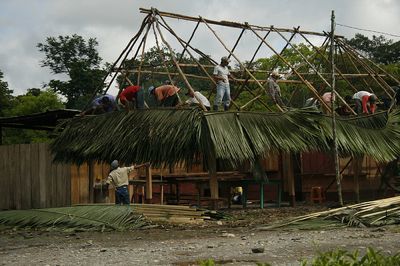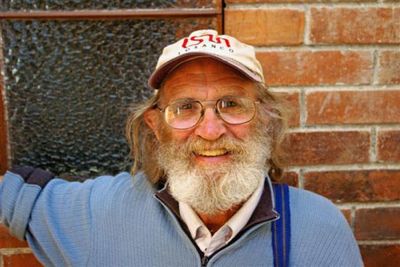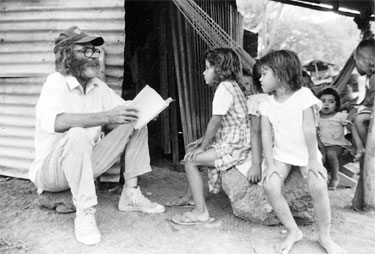One week after the murder of Rodrigo Rosemberg and the infamous video [1], as well as the subsequent protests dubbed the “white tsunami,” another violent murder took place in El Ixcán, Guatemala. Armed men intercepted the car carrying 5 missionaries on their way to a meeting. Shots rang out and a Congolese priest, the Rev. Jean Claude Nowama was seriously injured and a priest from the United States, the Rev. Lawrence Rosebaugh was killed. The incident brought an end to the life of Rosebaugh, who is best remembered as a champion of non-violence and peace [2] during his years serving in Latin America.
Fellow priest from the same order and blogger, Joaquín Martínez Vega of Postulación General OMI [es] remembers Rosebaugh [4]:
Ironías de la Vida: el P. Lorenzo Rosebagh, OMI, que siempre caminaba a pie o en bicicleta (incluso desde Estados Unidos a Brasil) para ir al encuentro de sus predilectos: los niños de la calle y los afectados por el Sida, fue asesinado en un coche. Iba al volante de una furgoneta, con cuatro misioneros más que acudían a una reunión con sus hermanos, los oblatos de la Delegación de Guatemala.
Life is ironic: during his life, P. Lorenzo Rosebagh, OMI, who always walked or rode on a bicycle (even from the United States to Brazil) in order to to reach his favorite groups to work with: street children and AIDS patients, was murdered driving a car. He was driving a van, traveling together with four other missionaries, to attend a meeting with their peers, the OMI from the Guatemalan delegation.
Rosebaugh has been described as “A friend of the poor [6]” by the blog of the Arca community in Spain. During his 74 years on the earth, he had protested against the Vietnam War and advocated for the less fortunate during the civil war in El Salvador. In addition, he protested against nuclear weapons, against the School of the Americas, and had landed in prison several times because of his pacific resistance. He chose to return and work with the poor in “El Ixcán” in Guatemala. In his autobiography he wrote:
De vuelta a los Estados Unidos, después de haber estado con los pobres y haber experimentado sus condiciones de vida, me siento como pez fuera del agua. Suspiro por el día en que pueda volver a Guatemala.
Back in the United States, after being with the poor and experiencing their life conditions, I feel like a fish out of water. I dream of the day that I can return to Guatemala.
 [7]
[7]The Ixcán Region by Turn the City and used under a Creative Commons license. http://www.flickr.com/photos/smilegonesour/2869466038/
The community of Playa Grande Ixcán [8] located in El Quiché, which Rosebaugh chose to work with is often complex and dangerous. However, its landscape is beautiful and its people are welcoming, but have had a difficult history during the armed conflict. Many of the communities that live there belong to different ethnic groups, and each has a different meaning for the name of their region based on the language, as explained by the blog [9] Seguimiento Consultas [es]:
Para los kaqchikeles el termino Ixcán significa Mujer Serpiente o Madre Serpiente, haciendo referencia a la forma de serpiente que toma el río Chixoy y el río Ixcán en su trayectoria por el Municipio y dentro del territorio mexicano. En el idioma Canjob'al, Ixcán significa tierra de muchos relámpagos y muchas lluvias, seguramente haciendo referencia a esta característica del Municipio sobre todo en el inicio de la época de lluvias.
For the Cakchiquel the term “Ixcán” means Serpent Woman or Serpent Mother, and it refers to the shape of Chixoy River and Ixcan River in their paths across the village and inside Mexican territory. In Q´anjob´al language, it means the land of thunder, since electrical storms are characteristic of the village during the rainy season.
This area was hit hard during the Civil War [10]. Ten years ago, the United Nations Comission declared that the State had committed crimes against humanity [es] [11] in the Ixcán area and that those responsible should be prosecuted. Many of these crimes were committed against members of the Catholic Church.
James Rodríguez of Mi Mundo explains about the Catholic Church's historical presence in this region [12] and the communities’ resistance against State-sponsored repression:
During the mid 1960's, several government and church-sponsored programs were developed in order to colonize the densely forested region of Ixcan. Covered by a thick jungle, Ixcan is located on the northern third of the department of Quiche, bordering with Chiapas, Mexico. During the beginning of the 1970's, the efforts to populate the region gave birth to the five communities that together once formed the Great Ixcan Co-Op of Various Services: Mayalan, Xalbal, Pueblo Nuevo, Cuarto Pueblo, and finally Los Angeles. “In 1975,” however, “a gradual process of militarization spread across Ixcan, which coincided with the beginning of activities by the Poor Peoples Guerilla Army (EGP) in the region.”
In 1982 the repression [by the army] against the communities in Ixcan rises massively in scale due to the new counterinsurgency policy implemented by the military. Known as the Scorched Earth campaign, the new strategy dictates the complete extermination and destruction of entire communities so as to defeat the guerrilla [by wiping out what was perceived to be their base structures]. It is under this new policy that the Cuarto Pueblo massacres take place, surely the ones with the most historical impact in Ixcan.”
The Catholic Church has played a protagonist role throughout Ixcan’s history: during the 1960’s and 70’s, several of the colonization programs were sponsored by it. In addition, thanks to the support of Monsignor Julio Cabrera, previous Bishop of Quiché, a loan from CARITAS was granted which allowed the community to buy the former San Isidro Ranch in 1996, known today as the Community Primavera del Ixcan.
Now years later, another type of crime is responsible for the death of Father Lawrence, in what is being described as a robbery or carjacking. Eight other people were murdered in the same area in less than a month, according to Combate Virtual [es], a blog that republished a communique from the Guatemalan Syndicate Union of Workers [13] that is demanding justice for these recent deaths.

